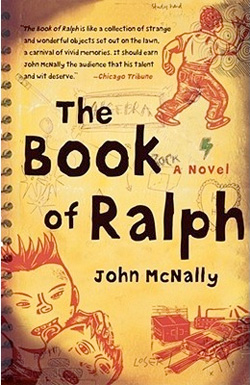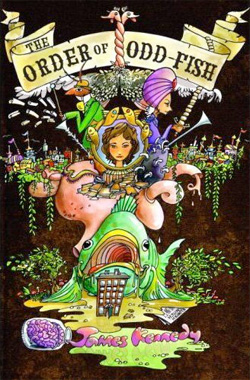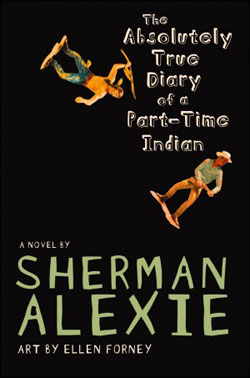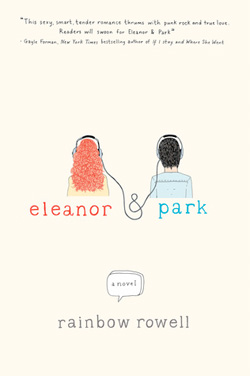| « "Groveland," Two Decades On: Mary Pattillo Returns to Neighborhood of Black Picket Fences | Mason Johnson Celebrates his Debut Sad Robot Stories, and You're Invited » |
Book Club Tue Aug 20 2013
For School the Bell Tolls: Book Club's Favorite "Back-to-School Books"
Beginning next week, Chicago public school bells across the city will ring in the beginning of a fresh school year. To celebrate this season of new beginnings (and to relive the excitement of that English class reading list), we at Book Club have compiled a list of our favorite "back-to-school books": stories that capture, with breathtaking accuracy, the friendships, romances and, in some cases, the cockroach butlers that fill the semesters of our characters' lives. Read on, and don't forget to comment on your faves!
 In the The Book of Ralph, John McNally creates a world based on Chicago's southwest suburbs (Burbank, Oak Lawn), and populated by a pair of kids that become the unlikeliest of friends. The narrative follows the hijink-ing duo through middle school into adulthood, weaving in landmarks like the Ford City Mall and the Tootsie Roll factory, as well as the power lines running over playing fields and neighborhood bars (before the smoking ban). For those of us who grew up on the south side (myself included), the story evokes many specific memories, but also the feeling of early fall when school's back in session, leaves are blowing through the playground, and classmates are discussing what to be for Halloween. It's a must-read for any Chicagoan.
In the The Book of Ralph, John McNally creates a world based on Chicago's southwest suburbs (Burbank, Oak Lawn), and populated by a pair of kids that become the unlikeliest of friends. The narrative follows the hijink-ing duo through middle school into adulthood, weaving in landmarks like the Ford City Mall and the Tootsie Roll factory, as well as the power lines running over playing fields and neighborhood bars (before the smoking ban). For those of us who grew up on the south side (myself included), the story evokes many specific memories, but also the feeling of early fall when school's back in session, leaves are blowing through the playground, and classmates are discussing what to be for Halloween. It's a must-read for any Chicagoan.
- John Wawrzaszek
Mark Yakich's debut novel asks readers to attend an event the overwhelming majority of my former peers will avoid like an airborne disease. In A Meaning for Wife, a recent widower returns to his Chicagoland hometown for his high school's vigintennial reunion. One of the most remarked-upon features of the novel is the unique use of second person narration. Yakich pulls it off by saddling his main character with a finicky infant and a schizophrenic father, plus all the baggage that attends any sort of forced meeting with folks you haven't spoken to in a while. The resulting portrait of a father who finds himself out of place in a town he struggles to call home is sweet, a little sad, and totally relatable. Check out Airplane Reading, Yakich's collaboration with Loyola NOLA colleague Christopher Schaberg for more stories of arrival and departure.
- Diego Báez
When you pick up a Daniel Pinkwater novel, it's best to just strap in your eyeballs and go along for the wacky ride. In Alan Mendelsohn, the Boy from Mars, nerdy, portly Leonard Neeble moves to a new town just in time to experience the tortures of junior high. Luckily, he meets an ally in weirdo Alan Mendelsohn, who, you guessed it, claims to be from Mars. Together they roam the suburbs, learning the art of mind control from an occult bookstore owner, rubbing elbows with interstellar bigwigs, and liberating an alien race from a cruel trio of dictators. Alan Mendelsohn, the Boy from Mars is what the age-category-obsessed publishing industry would likely call "middle grade," but its wild ride of zany sci-fi antics, humor, adventure, colorful characters and imagination--cranked up to 11-- is an enjoyable read for all ages. An undercurrent of adolescent vulnerability and friendship rounds out the breathless plotting with dollops of real human pathos.
- Eden Robins
 What can be more important for the back-to-school book list than a fun literary means of escape? James Kennedy's The Order of Odd-Fish is an absurd and hilarious young adult fantasy novel about a 13-year-old girl who struggles against a horrifying destiny in a world where butlers are foppish talking cockroaches and an order of knights is wholly committed to the act of "dithering." Part Douglas Adams and part Roald Dahl, this is the sort of book that can inspire both uncontrollable fits of laughter and deep philosophical thought. Jolly good fun for young and old alike.
What can be more important for the back-to-school book list than a fun literary means of escape? James Kennedy's The Order of Odd-Fish is an absurd and hilarious young adult fantasy novel about a 13-year-old girl who struggles against a horrifying destiny in a world where butlers are foppish talking cockroaches and an order of knights is wholly committed to the act of "dithering." Part Douglas Adams and part Roald Dahl, this is the sort of book that can inspire both uncontrollable fits of laughter and deep philosophical thought. Jolly good fun for young and old alike.
- Alba Machado
Tired of YA heroines who mope about sparkly vampires? Then E. Lockhart's The Disreputable History of Frankie Landau-Banks will feel like a breath of feminist fresh air. Set in a preppy New England boarding school, it follows the travails of 15-year-old Frankie as she tries to take down her boyfriend's all-male secret society. Frankie subverts the good ol' boy rules her school dearly adheres to with smarty-pants pranks, a belief in girl power, and even some Foucaldian analysis. Lockhart is able to push forth notions of patriarchy and gender equality without sermonizing her readers. And though Frankie feels the pain of being rejected simply for being a girl, she also understands that "It is better to be alone...than to be with someone who can't see who you are."
- Ines Bellina
 In The Absolutely True Diary of a Part-Time Indian, Junior is an intelligent and budding cartoonist with big dreams living on the Spokane Indian Reservation. For his freshman year, he decides to leave his rez school and trek to an all-white school for a better education. The Indians on the reservation see him as a traitor, and aside from the school mascot, Junior is the only Indian at his new school. At school, he must traverse his teasing peers and try to fit in, while at home he faces the devastating problems of poverty and alcoholism.
In The Absolutely True Diary of a Part-Time Indian, Junior is an intelligent and budding cartoonist with big dreams living on the Spokane Indian Reservation. For his freshman year, he decides to leave his rez school and trek to an all-white school for a better education. The Indians on the reservation see him as a traitor, and aside from the school mascot, Junior is the only Indian at his new school. At school, he must traverse his teasing peers and try to fit in, while at home he faces the devastating problems of poverty and alcoholism.
Sherman Alexie's first young adult novel is not just for young adults. People of all ages will laugh and cry along with Junior, a loveable and one-of-a-kind character. Along with his heartbreaking honesty, Junior's hilarious and heartwarming drawings are sprinkled throughout the book, so this novel really does feel like the diary of a part-time Indian.
-- Mikaela Jorgensen
Reading, writing, and espionage? It's back to school for 23 genetically-altered orphans being trained as cold-hearted assassins as part of the shadowy Omega Agency's Pedemont project in The Orphan Factory by James Morcan and Lance Morcan.
Beginning in a Chicago warehouse in the 1970s, this prequel to the Morcans' The Ninth Orphan recounts the origins of Number Nine, the spy who will eventually rebel against Omega and live life on the run. The inclusion of actual events (such as the Jonestown massacre and Bill Clinton's presidential election) lends authenticity to the story, while the ease in which they are manipulated by Omega shows that seeing is not necessarily believing-- an eerily relevant lesson in our media-saturated world.
-Kathryn Pulkrabek
 High school romances abound (God love 'em), but Rainbow Rowell's lovely Eleanor and Park is something out of the ordinary. It's a love story, a time capsule, and a sometimes-wrenching look at the lack of agency kids have when their parents make damaging decisions. It's 1986 and Eleanor's the new kid on the morning bus; Park's her grudging seatmate. Slowly, inevitably, they fall in love over comic books and the Smiths. Eleanor, newly returned to the surrealities of her dysfunctional home after getting kicked out, navigates between her abusive stepfather and the school mean girls with verve (and scraps of fabric from her mother's sewing basket pinned over the holes in her jeans). Korean-American Park tries to stay cool, keep his head down, and ride the line between pleasing his father and being the guy who rocks a mohawk and a little eyeliner. Rowell's insight into these characters pricks the heart; they're realistically drawn and dealing with real problems. But you know everything's going to be all right, as long as they can be together.
High school romances abound (God love 'em), but Rainbow Rowell's lovely Eleanor and Park is something out of the ordinary. It's a love story, a time capsule, and a sometimes-wrenching look at the lack of agency kids have when their parents make damaging decisions. It's 1986 and Eleanor's the new kid on the morning bus; Park's her grudging seatmate. Slowly, inevitably, they fall in love over comic books and the Smiths. Eleanor, newly returned to the surrealities of her dysfunctional home after getting kicked out, navigates between her abusive stepfather and the school mean girls with verve (and scraps of fabric from her mother's sewing basket pinned over the holes in her jeans). Korean-American Park tries to stay cool, keep his head down, and ride the line between pleasing his father and being the guy who rocks a mohawk and a little eyeliner. Rowell's insight into these characters pricks the heart; they're realistically drawn and dealing with real problems. But you know everything's going to be all right, as long as they can be together.
- Emilie Syberg
"Our close friendship was on that higher, exclusively intellectual level where one can rest from emotional troubles, not share them. . . Here he is, I would say to myself, that is his head, containing a brain of a different brand than that of the synthetic jellies preserved in the skulls around him." So Professor Charles Kinbote rhapsodizes of his colleague and crush John Shade in Vladimir Nabokov's Pale Fire.
What ardent college student hasn't dreamed this dream, that some deep and tacit accord hums between him and an admired professor? The pleasure in leafing through the layers of Pale Fire--told in the form of Kinbote's presentation, including foreword and footnotes, of Shade's final poem--is partly in its evocation of the genuine pleasures of scholarship: uncovering hidden connections, communicating with master thinkers across departments, continents, epochs. The pathos is in how determinedly off track Kinbote is in his exegesis. The book's complex structure makes it just the thing to settle in with on the first chilly night, a pile of reference sources at your side, and a window cracked to let in some bracing fall air.
- Daphne Sidor
So tell us what we missed. What are some of your favorite back-to-school books?










Jeremy / August 21, 2013 3:42 PM
Columbine by David Cullen